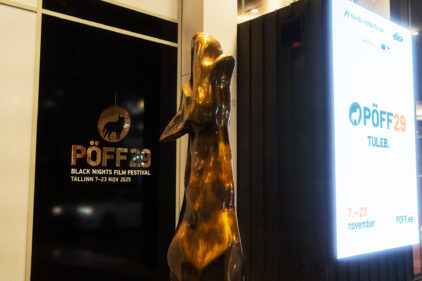CANNES, France–In a stunning surprise, Gus Van Sant’s “Elephant,” a low-budget independent film inspired by the Columbine shootings, won both the Palme d’Or and the best director award here Sunday at the 56th Cannes Film Festival.
The early favorite, “Dogville,” directed by Lars von Trier and starring Nicole Kidman, was completely shut out–as was Clint Eastwood’s praised and popular “Mystic River.”
The Cannes rules specify that only one prize can be given to a film. But the jury asked festival president Gilles Jacob for an “exception,” said its president, the director Patrice Chereau. That exception permitted not only the double award for “Elephant,” but also two prizes apiece for “The Barbarian Invasions,” from Quebec, and “Uzak,” from Turkey.
The fact that three films shared six of the festival’s seven major awards may have been a way for the jury to reflect the general opinion that this year the official competition was unusually weak. It included two films, Vincent Gallo’s “The Brown Bunny” and Bertrand Blier’s “Les Cotelettes,” that were booed with true enthusiasm.
A special jury prize was voted to Samira Makhmalbaf, the 23-year-old Iranian director whose “At 5 O’Clock in the Afternoon” was about Afghan women who are free of the Taliban but not yet free of a restrictive patriarchal society. In the film, Afghan women talk about what they would do if they were president. In her speech, Makhmalbaf said she would not personally want to be president “in a world where the most powerful president is George W. Bush.” Her logic was shaky but her meaning clear.
Denys Arcand, the 61-year-old director of “The Barbarian Invasions,” speculated that he would retire after the unfriendly Cannes reception of “Stardom,” his unsuccessful 2000 film. Good thing he reconsidered. “The Barbarian Invasions,” about a dying teacher who is joined by his friends and family during his last few days, was an enormous audience hit here–as well as with the jury, which gave Arcand’s film the screenplay award, and also named Marie-Josee Croze best actress, for her performance as the dying man’s wife.
“Uzak,” by Nuri Bilge Ceylan of Turkey, won the Grand Jury Prize, generally considered to be second place, and the Best Actor Award was shared by its two actors, Muzaffer Ozdemir and Mehmet Emin Toprak.
Tragically, Toprak was killed in an auto accident a day after learning the film had been accepted by Cannes. In the movie, he plays a country cousin who comes to visit his reclusive city relative and overstays his welcome as issues in their past bubble beneath the surface.
The Critics’ Prize, voted on by journalists at the festival and given independently of the jury, went to the Sundance winner “American Splendor,” inspired by the autobiographical comic books of the redoubtable Cleveland file clerk Harvey Pekar. The Camera d’Or award, for the best first film, was given by a jury headed by director Wim Wenders to “Osama,” by Siddiq Barmak of Iran. “Milwaukee, Minnesota,” by the American indie director Allan Mindel, won as the best feature in the Critics’ Week.
The jury, which included two Americans, director Steven Soderbergh and actress Meg Ryan, is traditionally secluded for its secret deliberations, while rumors, most of them inaccurate, race down the Boulevard Croisette. Their prizes are the most important in the world, after the Oscars, and a good deal more inventive.
Their work was cut out for them this year, by an official selection containing a few fine films, many bad films, and a few terrible films. “It was not the best of years,” Jacob observed diplomatically. Von Trier’s “Dogville,” a three-hour dirge set in Colorado but filmed entirely on an artificial sound stage set, was thought to be the winner by default, but found no favor with the jury.
Van Sant’s film is sure to ride its Cannes victory to a high-profile opening in North America. It stars unknown high school students from Portland, Ore., in the Columbine-inspired story of two teenagers who stage a massacre. Some admired it, some hated it; many speculated that its portrait of a violence-prone America helped it to win.
“The Barbarian Invasions” and Eastwood’s “Mystic River” were probably the two films audiences enjoyed the most, and both seem destined for box office success. The Arcand film was snatched up by Miramax, whose president, Harvey Weinstein, complained there wasn’t much else worth buying here this year.











